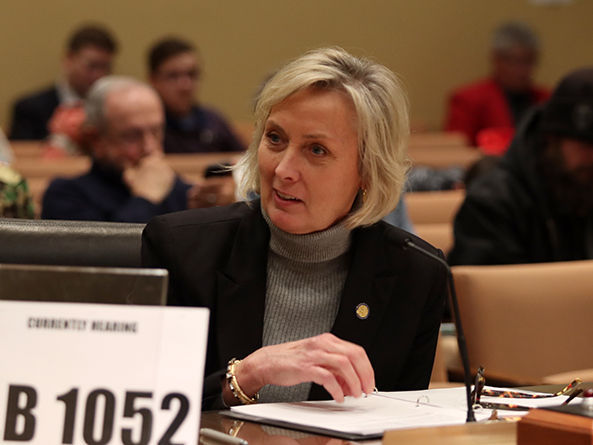School supply reimbursement proposed
Nebraska teachers could be reimbursed up to $300 for the purchase of school supplies under a bill considered by the Education Committee Jan. 22.
LB1052, introduced by Fremont Sen. Lynne Walz, would allow K-12 teachers from any approved or accredited public, private, denominational or parochial school to apply for reimbursement of up to $300 annually for school supplies purchased with personal funds.
The Nebraska Department of Education would be responsible for establishing a reimbursement policy and administering payments. To receive reimbursement, participating teachers would need to provide receipts for the purchased supplies and the policy would take effect beginning with the 2024-25 school year.
Walz said a report from the Institute of Education Sciences found that, on average, teachers spend $478 each school year on school-related expenses. Many teachers face financial difficulties, she said, and being reimbursed for school supplies could help alleviate that burden.
“This bill is meant to recognize and show appreciation for the work that [teachers] do, and to let them know that our state is here to support them too,” Walz said.
Tim Royers testified in support of the bill on behalf of the Millard and Nebraska State Education associations. He said teachers would appreciate acknowledgement of the money they spend on classroom-related items.
“The importance of this bill goes beyond just the dollars provided,” Royers said. “The acknowledgment of the state that teachers are taking these extra steps to make our classrooms welcoming environments goes a long way.”
Edison McDonald, executive director of the Arc of Nebraska, also supported the bill. He said that despite recent funding increases, special education teachers often use their own money to provide additional resources and support for their students.
Heidi Gilliland of Papillion spoke in opposition to LB1052, citing concerns over a $130 million bond in her local district and the additional burden the bill could place on taxpayers.
“When you talk about giving more money to teachers — while I appreciate everything they do — that’s my money, that’s my taxes,” Gilliland said.
The committee took no immediate action on the bill.


